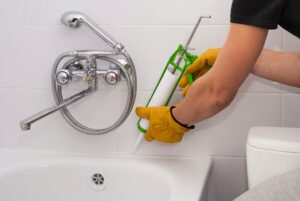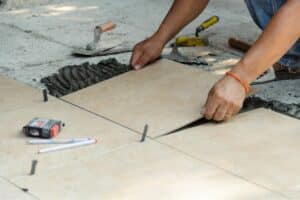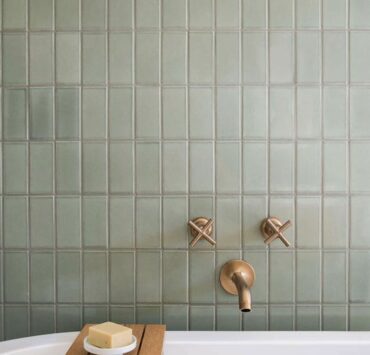Most of us like to keep our bathrooms clean on a regular basis. If you’re someone who is meticulous, there might have been one or two instances where you noticed the shower grout cracking on the bathroom tiles. Cracks appear especially in joints where the wall meets the floor, tub, or shower. But what causes these cracks and how do you fix them? If you are wondering the same, read this article to delve deeper into the matter and find out more.

Common Causes Of Grout Cracks
Wear And Tear
One of the reasons behind the cracked grouts in your shower is simply ageing. The bathroom is a space that’s constantly exposed to moisture. Temperature and humidity also keep fluctuating in these spaces. As you might know, grout is composed of water, cement, and sand. It’s a porous mixture, and given the persistent dampness, it’s only natural for the grout to decay over time.
Without proper maintenance, the grout might worsen in a short period. Hard water and soap scum, if allowed to accumulate, can erode the material quickly. Apart from splits, this can also lead to toxic mold which can cause further degradation. If you don’t get an opportunity to clean your bath daily, you must give it a thorough scrub at least once a week.
Movement Of Joints
One of the root causes of grout cracks is movement between two surfaces. Although we might not be aware or it’s not visually evident, our houses keep moving in tiny increments due to seasonal temperature changes, humidity, foundation settling, and several other reasons. When joints settle with tiles and the shower moves opposite ways, there’s a high chance of inflexible grouts forming cracks.
If you live in an earthquake-prone region, joint movement can be a bigger problem for you.
Faulty Installation
Installation is another factor that can bring doom to shower grout. A grout mixture prepared by an under-qualified installer might contain too much water or additives. In that case, air pockets might occur in the grout. More so, if the adhesive glue used is too little, the tile might come off from the wall easily and then it’s up to the grout to hold it in place. The pressure is liable to develop cracks.
So, it is recommended that you only hire the right contractor for tile or brick grouting. After the crack, more serious ones usually follow thereby paving the way for severe structural deterioration.
Can A Newly Installed Shower Grout Crack?

As mentioned above, shower grout cracks might develop due to various reasons. But if it’s recently installed and you still notice your shower grout cracking, the most likely reason is improper installation. Your installer probably didn’t use enough thin-set while setting the tile into place.
Another reason could be the adhesive. They might have used poor-quality adhesive or just too little of it for the grout to cling to. Sometimes, water might trickle into the gaps during the drying process. This can prevent the adhesive from drying adequately and make it ineffective. In either case, you need to consult the matter with your plumber and ask for a regrout. If not managed in time, the cracks can eventually cause further damage and deterioration.
How Much Damage Is Too Much Damage?
One question that might pop up in your head is, ‘When do I know if my shower grout really needs a repair?’ Well, you don’t have to wait till the grout degrades to see its worst day. You can get the cracks fixed early on to prevent severe damage. The problem is, crumbling grout seems like a minor aesthetic imperfection, but it can be a bigger issue than it appears to be. So, keep an eye out for such cracks and get in touch with a professional as soon as you notice any such development.
How To Fix Cracks In Shower Grouts?
Whatever be the reason behind their formation, shower grouts aren’t a good sign for the infrastructure of your bath. If the cracks are tiny and isolated, they can be managed easily. In fact, you can do a simple patch repair without bothering a plumber. How would you repair cracked grout, you ask? Well, here are a few guidelines on grout fixing that might come in handy for you.
The first step is to extract the old grout from the affected area completely. The task will be easier if the grout is severely crumbling. But if it’s a minor crack, you might want to use a grout removal tool like a saw to finish the job. Once you’re removed, thoroughly vacuum the area to remove any dust particle that could be left behind.
The Best Grout Removal Tools




The next step is to find a suitable replacement for the grout. Silicone caulk is a viable option as it is flexible and less likely to crack. If your cracks are caused by joint movements, a strip of caulk might do the needful. One thing to remember here is the color of the caulk that you choose.
To not spoil the look of your space, it is ideal that you visit a nearby hardware store or a tile shop to find the color that matches your existing grout. Also, check if the caulk is mildew-proof. If not, future developments of cracks are on the cards.
After you select and buy a fitting caulk, there comes the last step, i.e., the application. For this, go through the instruction manual to the dot and follow it accordingly. Although you don’t require professional help with this, a little experience can prove to be helpful. Silicone caulks sets quickly and can be a little difficult to work with.
Besides, you’d need a caulking gun to apply the silicone with. But don’t worry! Below listed are some of the best caulking guns available to set out for the task.




Try the process on scrap materials first, if you’re unfamiliar with the process. Once you get a hang of it and see the trick is working, get to the actual implementation.

Closing thoughts
Now, the above guidelines might not work if the fissures are widespread. Besides, if you do not have the right tools and equipment, it’s best if you leave the task to trained professionals. The necessary tools for a grout repair include silicone caulk, a caulking gun to apply the silicone with, pre-mixed grout (for extensive fissures), and grout float to spread the mixture. Typically, homeowners usually don’t have all of these equipment, which is alright. That’s why it’s better to rely on a plumber to handle all the mess.








